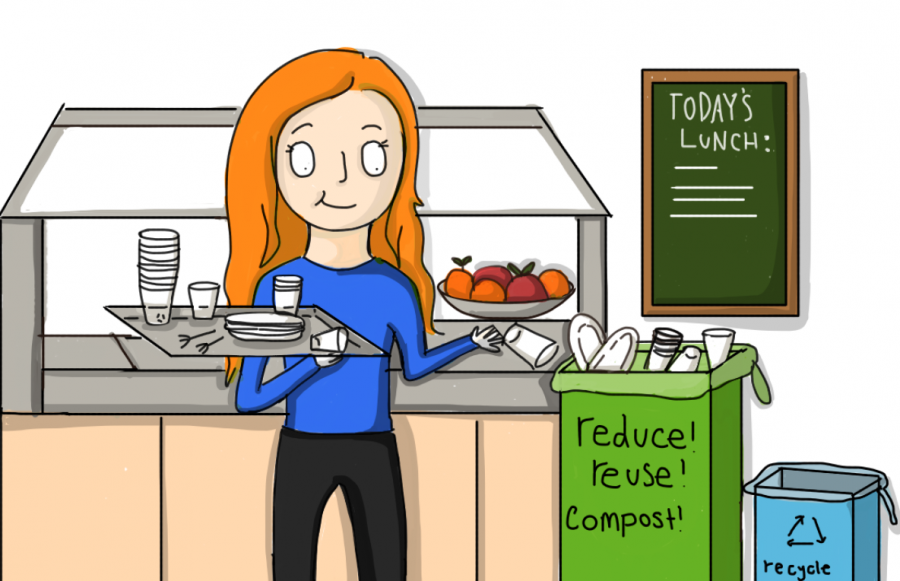Reducing, reusing — but not recycling
Buying reusable items are a better option to compostable plastic
February 14, 2020
Labeling products as “biodegradable” or “compostable” is a great marketing tool for brands trying to avoid public scrutiny, but eco-friendly consumers choosing to buy these products may be giving the environment the short end of the stick.
Most single-use, plastic cups labeled compostable and found in the school cafeteria or in restaurants are made of PLA plastic that is marketed as biodegradable, but it can only be industrially composted, according to the Student Environmental Resource Center at the University of California Berkeley.
These plastics can take anywhere from 30 to 90 days to decompose in ideal conditions, and for composting facilities running on short cycles, they simply take up too much space.
These plastics often end up in landfills, which resemble vacuum chambers with no oxygen, and decompose anaerobically, producing methane gas as opposed to carbon-dioxide — which is worse for the environment.
Just because something is “plant-based” does not mean it is a safe and green choice. Companies who use these labels are trying to appeal to eco-friendly customers looking for simple solutions instead of choosing reusable items instead of single-use products that are hard to compost.
Even if these products end up in the compost bin, most commercial compost facilities have a policy against commercial dishware such as PLA plastic cups or compostable utensils and will send them to landfill, according to Live Science.
Recology San Francisco will only compost plastics specifically labeled as compostable. Biodegradable plastics are placed into landfill.
It should not take rocket science to be an environmentally-conscious shopper, but the complexity of single-use compostable items might mean that shopping may not solve this ethical dilemma.
In the biodegradable frenzy that has followed the climate justice movement, consumers have forgotten the original environmentally-friendly slogan: reduce, reuse, recycle.
Products labeled as plant-based are popular because they allow consumers to be lazy and experience the convenience of single-use products while still feeling as though they are making a difference.
The assumption is that because the products are compostable, they have little to no impact on the environment, which is not quite accurate.
Assuming these biodegradable plastics actually end up in the compost, PLA plastic takes six months to decompose, according to TrueChoicePack Corp, a manufacturer of disposable products.
Consumers can make the kindest choice for the environment by reducing consumption of plastic all together. Although it may be less convenient to bring a coffee mug to school or a coffee shop instead of using a single-use cup, behavioral changes like this can have a big impact on an individual’s environmental footprint.
The only way to make a difference as part of the climate justice movement is to make it clear that this change is a priority and to minimize the demand of supply. It should start with change in our own habits, as well as with our school cafeteria.
The Broadway Campus currently cafeteria uses single use plates, cups and utensils, and only elementary school students eat from reusable trays because of the lack of dishwashing equipment.
While adding the equipment and reusable dishware seems to be a future goal for the school, there is no immediate plan to make this happen.
Allocating resources to add adequate dishwashing facilities in the near future would not only reduce our school’s carbon footprint, but it also sends a message of what our priorities are.
Until then, using reusable containers and utensils is the best way to spark change.










